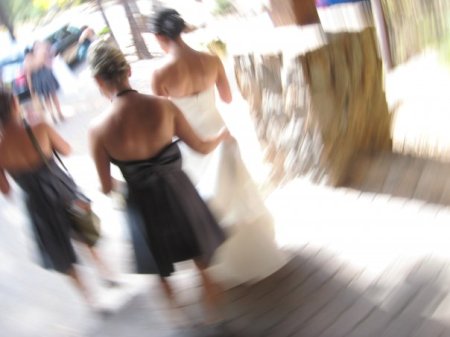Life is changing.
I’m careening toward the end of my 25th year and 10 months into my first job. I get up and go to work every morning wearing heels and something semi-professional. I do my make-up and hair in the morning and undo it every night. I’m getting really sick of that already.
A few months ago, I bought a house — me.
My life has almost all the trappings of adult-hood. But, sometimes, I still get deja vu. I flash back to a day when we lived in Louisiana, so I must have been 5 or 6. I’m shuffling through my mom’s closet, picking out the prettiest jacket and skirt I’d wear if I got to go to work like she did. I put on a white suit with shoulder pads — and a pair of her high heels, too. I look at myself in the mirror. Not as pretty as my dress-up clothes, I think.
You see, I am not an adult. I am still in the throes of growing up, nagged by a mix of annoyingly existential and incredibly superficial questions — am I making a difference with my life? Is this is where I should be? What if I had become a singer instead? Should I grow out my bangs?
They are questions left over from an adolescence of insecurity coupled with a future of unending potential. Forever, the possibilities were endless and I could do anything. And I expected I would. That was my story — the one I’ve been writing for myself since I was 10 years-old.
But, at some recent point, I put down the pen. I gave up writing my never-ending draft and decided to sit back and drink a glass of wine, or something. It didn’t last long.
Now, with each question I ask myself, I’m trying to edit my life story — starting somewhere in the middle. But, with each answer, I’m closing another door. I bought a house. I picked a city to live in. I chose a career.
My life is not only already half-shaped — so am I. The possibilities are no longer endless.
I’ve been reading a lot of nonfiction lately written by not-very-old women who have gone through some kind of transformative experience, usually involving some kind of travel, or great loss, or something. They find themselves and then they find love. It’s a coming of age tale, a common enough narrative that should inspire me. But lately, this story line has become my obsessive mantra. I repeat it to myself, find it in everyone around me and continually fail to live up to it.
I’m constantly watching the lives of other women and writing their life stories for them. There’s always a clear path and a for-now conclusion. If I commit myself to one life, I’ll be strong like my sister. If I can stop feeling sorry for myself, I’ll be content like my best friend. If I could take the risks I know I should, I’ll be more like the woman I want to be.
But I’ve never been a risk-taker. When I was a kid at a sleep-over three blocks away from my house, I’d get homesick at 9 p.m. and call my Dad to come and get me. But, every leap I’ve taken in my life — and I’ve taken some — has been in direct retaliation against this part of myself.
I knew my instinct was to huddle up in my bed at home, so I moved across the county to New York the first chance I got. When I was 15, I refused to risk speaking even one word in French to our exchange student from Paris the whole summer he lived with us, so I majored in the language in college and spent 6 months living in Paris. I made myself do the things that terrified me most.
It’s the central paradox of me. And it means I’ll never stop striving — to achieve, to succeed, to love, to live. And it means that I’ll be fighting myself every step of the way as I do it.
I am not an adult. I am still in the throes of growing up. But, then again, I probably always will be.































